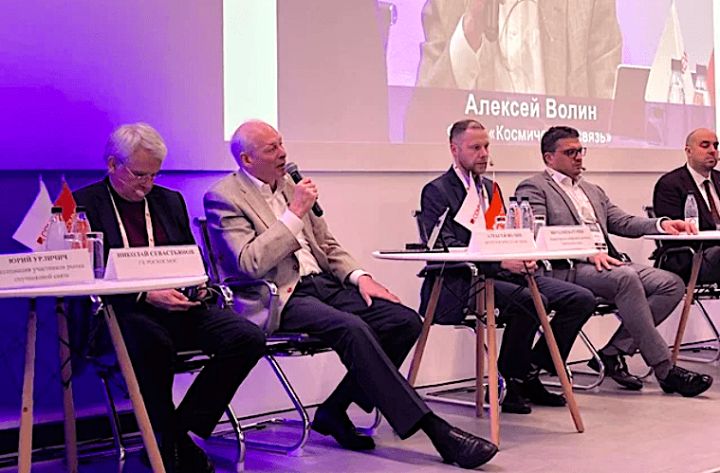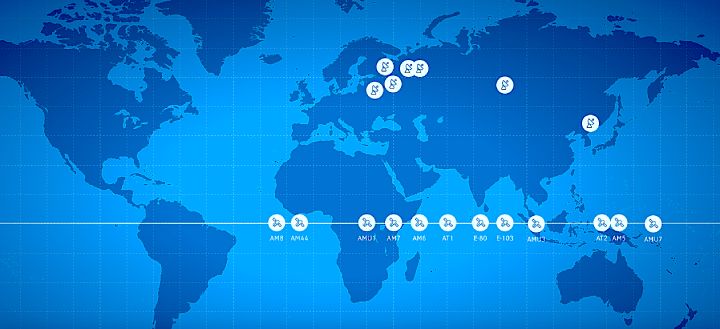 Alexey Volin, general director of Russian Satellite Communications Co., RSCC, seated second from left. (Source: Satcomrus)
Alexey Volin, general director of Russian Satellite Communications Co., RSCC, seated second from left. (Source: Satcomrus)
PARIS — Russia’s largest satellite fleet operator said the company’s plans to use bandwidth from non-Russian satellite constellations will need to be scrapped as western sanctions force Russia “to rely on domestic satellites only,” and that Russian satellite builders similarly lose access to non-Russian satellite payloads.
Alexey Volin, general director of Russian Satellite Communications Co. (RSCC), said Russia’s use of flexible-payload satellites needs to increase to avoid a bandwidth shortage given that Russian manufacturers no longer deliver satellites as quickly as before.
Addressing the Feb. 18 Satellite Russia 2023 conference, Volin said the sanctions have meant Russian satellite builders now take four years to complete an order. Volin said the possible bandwidth shortage could occur starting in 2028 or 2029 without a program to renew the domestic fleets with new-generation satellite designs.
“At the moment, RSCC and Gazprom Space Systems [an RSCC competitor] fully cover the needs of Russian consumers,” Volin said. “Both we and Gasprom are planning to rely exclusively on our own forces in the near future. We now count entirely on domestic payloads when designing new satellites.”
European satellite prime contractors Airbus Defence and Space and Thales Alenia Space both had regular commercial transactions with Russia’s space industrial base, both as buyers and sellers of hardware. That’s in addition to Europe’s use of Russia’s Soyuz rocket to launch mainly European civil government payloads.
Operation of the Europeanized Soyuz ceased, as did the Europe-Russia satellite hardware trade, with the invasion of Ukraine.
 The challenge for Russia’s satellite operators, including Russian Satellite Communications Co. (RSCC), whose fleet is shown here: How to maintain coverage and capacity when access to its traditional payload component suppliers has been shut down. (Source: RSCC)
The challenge for Russia’s satellite operators, including Russian Satellite Communications Co. (RSCC), whose fleet is shown here: How to maintain coverage and capacity when access to its traditional payload component suppliers has been shut down. (Source: RSCC)
RSCC said its Express-AMU4 satellite, now in development, will be its first fully domestic telecommunications satellite. It is being built by a consortium of multiple Russian companies led by Russia’s biggest telecommunications satellite prime contractor, Information Satellite Systems Reshetnev.
The need to consolidate Russia’s satellite ecosystem to contend with sanctions has led to the creation of the Association of Satellite Communications Market Players.
“We are aware of the fact that in the current environment, we need to interact with each other,” Volin said. “Our communication has intensive, including through competence centers.”
In January, RSCC and Gazprom Space Systems joined other industry representatives in signing an agreement with Russia’s space agency, Roscosmos, and with the Russian government to set a strategy for “Advanced Space Systems and Services” to help the space sector reorganize in response to the sanctions.
The Russian government has forecast that more than 700 telecommunications satellites and more than 60 Earth observation satellites are scheduled to be deployed between 2023 and 2030.
Read more from Space Intel Report.
